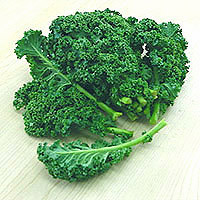health guides
Kale

Preparation, Uses, & Tips
Wash kale well by dunking it in a bowl of tepid water a few times and then rinsing under cold running water. Small kale leaves can be used whole. The larger leaves should be stripped or cut from the centre rib. The rib can be chopped into small pieces and cooked with the leaf or discarded. To shred the leaves, place them in a pile, roll up, and then thinly slice them.
Baby kale can be used raw mixed with other greens in salads. Mature kale must be cooked, as it is too tough to consume raw. It can be steamed, but tastes best when boiled or simmered in vegetable broth.
Kale can also be added to soups and stews. It is especially good in soups that contain potatoes, barley, or beans. Kale with white beans and sausage is a traditional Portuguese soup. Good ways to flavour kale are to add any of the following: garlic, olive oil, fresh lemon juice, toasted sesame oil, cinnamon, caraway seeds, currants, or toasted pine nuts.
To boil
Traditional ways to prepare kale call for long cooking—about 40 minutes—until it is very soft. However, kale can also be boiled quickly, about 5 to 8 minutes, until it is just slightly crunchy.
To sauté
Boil the kale first for about 5 minutes to enhance its flavour. Then sauté in oil with onions and garlic for about five minutes.
To microwave
Place the kale, with just the water clinging to its leaves, in a covered microwave-safe dish. Cook on high for 7 to 10 minutes, stirring after 4 minutes. Let stand, covered for 3 minutes before serving.
Copyright © 2024 TraceGains, Inc. All rights reserved.
Learn more about TraceGains, the company.
The information presented in the Food Guide is for informational purposes only and was created by a team of US–registered dietitians and food experts. Consult your doctor, practitioner, and/or pharmacist for any health problem and before using any supplements, making dietary changes, or before making any changes in prescribed medications. Information expires December 2024.


 We are proud to announce that
We are proud to announce that  As the market evolves, customers increasingly request a wider variety of omega-3 options for their lipid...
As the market evolves, customers increasingly request a wider variety of omega-3 options for their lipid...  Maintaining healthy glucose levels is crucial for preventing metabolic conditions like diabetes,...
Maintaining healthy glucose levels is crucial for preventing metabolic conditions like diabetes,...  Looking at formulating a new vitamin blend? Discover
Looking at formulating a new vitamin blend? Discover 







































